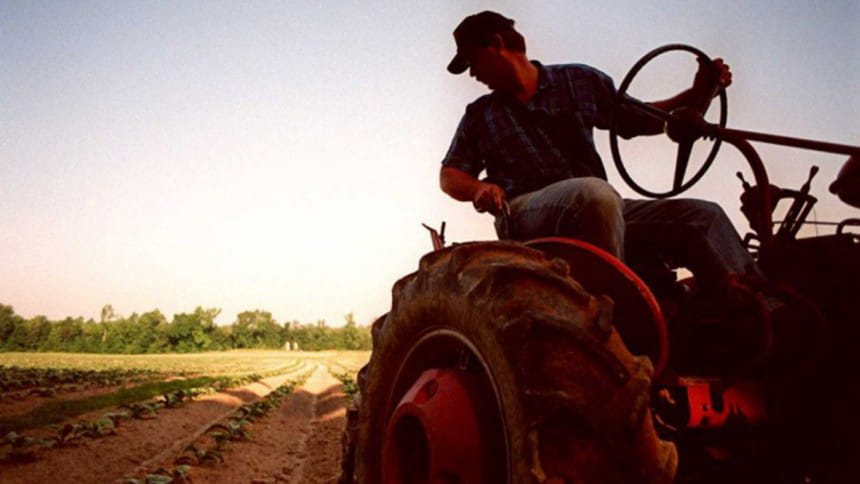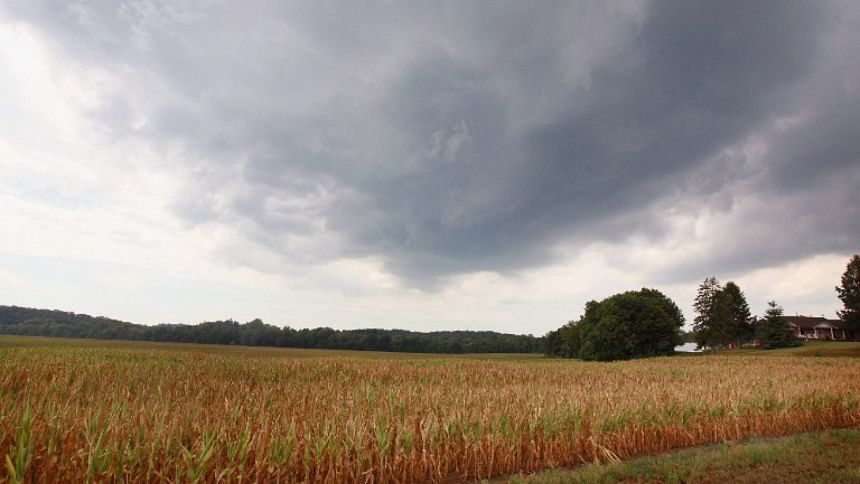US scientists warn on 'dustbowl' risk

US scientists have modelled how a 1930s-like "dustbowl" drought might impact American agriculture today, and found it to be just as damaging.
But the research shows the effects to be very sensitive to temperature, meaning the potential losses would be far worse later this century if Earth's climate heats up as expected.
A repeat of 1930s weather today would lead to a 40% loss in maize production.
In a 2-degree warmer world, it becomes a 65% reduction, the team projects.
"The 1930s were really extreme and, yes, the chances of the same precipitation distribution happening again are small," explained Joshua Elliott, from the University of Chicago's Computation Institute.
"But the temperature distribution wasn't any more extreme than we've seen in 2012 or 1998, for example.
"And what we see at higher temperatures is that these crops - maize and also soy - are so sensitive that an average year come mid-century could be as bad as 1936, even with normal precipitation," he told BBC News.
Dr Elliott was speaking here at the annual meeting of the American Association for the Advancement of Science.
He has been taking part in a discussion session on so-called "food shocks", where the failure of key crops can lead to rapid global price hikes.
What would a 1930s-like dustbowl drought look like today? #AAASmtg @FoodSecurityUK https://t.co/mEUhqROL8x pic.twitter.com/lEW17UahCE
— Jonathan Amos (@BBCAmos) February 13, 2016
Dr Elliott is a member of a joint US-UK taskforce that last year assessed the resilience of the world's food system. The fall-out from extreme weather was deemed to be a major concern, especially if future climate change is not moderated by a reduction in the emission of heat-trapping gases from the burning of fossil fuels.
Looking at the production of the major grains - rice, wheat, maize and soybeans - the taskforce's scientists found that the chances of a one-in-100-year production disruption was likely to increase to a one-in-30-year event by 2040.
Implementing reforms that would enable the system to cope better in the future was seen as a priority.

Northern shift
One factor that does not help is the way that production of some of these important crops is highly concentrated.
The US, for example, is the leading producer in the world for maize, with most of it grown in just Iowa, Minnesota, Nebraska, and Illinois.
But Dr Elliott said this concentration would have to be broken up, that a different and more varied approach would be needed if more extreme weather became the norm in the decades ahead. Maize might be better grown further north than the traditional Midwest states, he suggested.
"It's most likely they will have to start growing other crops.
"Maybe by mid to late century, Iowa will be known as the cotton state rather than the corn state, because cotton will basically have been eradicated out of much of the southern states because the temperature thresholds will have blown way past what cotton can handle there.
"Assuming there is enough water in Iowa, because cotton is a very thirsty crop, it could become the cotton state."
Kirsty Lewis, from the UK's Met Office, is looking at the weather connections between important "breadbaskets".
The US Midwest is the dominant hub for maize, but the northeastern plains of China are not too far behind.
How likely is it that both regions could suffer bad growing seasons in the same year?
A search through the meteorological records would seem to suggest that whenever one stumbles, the other seems to do OK.
Dr Lewis is now running multiple simulations on a climate model to test whether there really is some sort of teleconnection between the two.
"Is there a physical mechanism why that's the case, or is it just by chance?" she asks.
"They may be physically linked, possibly by larger-scale drivers to do with ocean temperatures - that kind of thing. But will this change in the future; and if it doesn't, can we be sure we understand why the pattern will continue?"
A dust storm rolls through Amarillo during the Dust Bowl, 1936. #TexasHistory #Texas pic.twitter.com/gWfok6d8pP
— Texas History Pics (@Texas_Pictures) February 2, 2016
For Tim Benton, from the UK's Global Food Security Programme, a change of attitude is required on the part of all the players in the global food system, to recognise that extreme weather is going to be an ever-present threat in the future.
"How do we build resilience? Well, we need to understand better what the risks are, and that's a research question and lots of people around the world are doing that now," he said.
"We can also adapt agriculture and plan more for the bad years.
"Rather than seeing bad years as something that's rare and unlikely, we should go into each season with an expectation that 'average weather' doesn't exist anymore. It's either too hot, or too wet, or too cold or too dry.
"An average summer is very difficult to find these days."

 For all latest news, follow The Daily Star's Google News channel.
For all latest news, follow The Daily Star's Google News channel. 








Comments